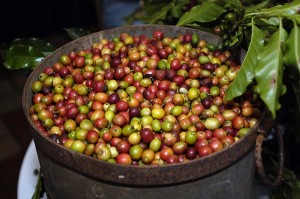Agriculture Dept. gets $352K to promote specialty crops


In the past, the The agency will also be called upon to increase international sales of Puerto Rico’s coffee. (Credit: © Mauricio Pascual)
The Puerto Rico Agriculture Department has been awarded $352,290 from the U.S. Department of Agriculture to develop eight projects that will increase sales of specialty crops by improving food safety through training and mentoring programs, the federal agency announced Tuesday.
With the funds, allocated through the USDA’s 2013 Specialty Crop Block Grant Program, the local agency will increase local specialty crop sales by implementing a large-scale promotional campaign including television, radio and print advertisements supporting such crops under the “Del País” brand. Matching funds will be used to cover the cost of the inclusion of non-specialty crops.
The agency will also be called upon to increase international sales of Puerto Rico’s coffee by supporting the participation of at least two coffee producers in Specialty Coffee Association of Europe trade shows and export promotion activities.
Agriculture will also work to increase production and consumption of local leafy green vegetables in schools by providing food safety training to producers and nutrition education in schools.
Meanwhile, the agency will partner with local groups Apiarios Caraballo, Nuestra Escuela Inc., Plenitud Iniciativas Eco-educativas Inc. and Nutricaribe Inc. to develop a number of projects.
With Apiarios Caraballo, the agency will work to increase the production of honey and increase the yields of vegetable producers by providing beehives and beekeeping training to potential beekeepers and existing vegetable growers.
In conjunction with Nuestra Escuela Inc. they will develop a new generation of farmers by educating at-risk youth from Vieques in fruit and vegetable farming techniques through a formalized hands-on training program.
Meanwhile, the agency will partner with Plenitud Iniciativas Eco-educativas Inc. to increase yield, productivity and sales of leafy greens such as kale and moringa by designing, building, and demonstrating a bioponics system — defined as an all-organic form of hydroponic farming — and training growers how to use it.
The island’s cacao industry is also about to get a boost, as Agriculture will use federal funding to recruit farmers to plant and farm 10,000 cacao trees in partnership with Nutricaribe Inc.
In all, the USDA will invest $52 million in grants to support specialty crop producers, split into 54 block grants to U.S. states and territories that will support 694 initiatives nationwide. The grants will assist producers of fresh fruits and vegetables and help strengthen markets for specialty crops such as fruits, vegetables, tree nuts, dried fruits, horticulture, and nursery crops, including floriculture.
“These investments will strengthen rural American communities by supporting local and regional markets and improving access to fresh, high quality fruits and vegetables for millions of Americans,” said Vilsack. “These grants also help growers make food safety enhancements, solve research needs, and make better informed decisions to increase profitability and sustainability.”
The Specialty Crop Block Grant Program for fiscal year 2013 supports initiatives that: increase nutritional knowledge and specialty crop consumption; improve efficiency within the distribution system and reduce costs; promote the development of good agricultural, handling and manufacturing practices while encouraging audit fund cost-sharing for small farmers, packers and processors; support research through standard and green initiatives; enhance food safety; develop new/improved seed varieties and specialty crops; control pests and diseases; create organic and sustainable production practices; establish local and regional fresh food systems; and increase healthy food access in underserved communities, the agency said.






